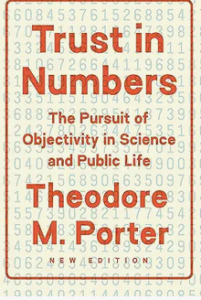I’ve carved out as many empty days as possible this summer to make significant headway with my next book, and as well as writing I’ve been re-reading some golden oldies. One is Theodore Porter’s classic Trust In Numbers: The Pursuit of Objectivity in Science and Public Life. For those who haven’t read it, it’s a historical exploration of the pursuit of quantification in economic domains (accounting, cost benefit analysis) as an expression of objectivity. A core argument is that the assertion of quantified objectivity is a signal of a group’s lack of power rather than the opposite; powerful groups or people expect to have their judgment trusted.
This is counter-intuitive if one has read so often that the deployment of numbers is the way social and political power is exerted by economists and others. But the case Porter makes is persuasive, certainly as far as the historical origins of quantification go. He also acknowledges that objectivity has become a desired characteristics of societies governed by the rule of law: “A decision made by the numbers … has at least the appearance of being fair and impersonal. Scientific objectivity thus provides an answer to a moral demand. … Quantification is a way of making decisions without seeming to decide.” But he adds: “Objectivity lends authority to officials who have very little of their own.” So numbers have the dual purpose of signalling impartiality and thereby giving authority to the number-producers: “The reputation of accounts and statistics for grayness helps to maintain their authority.”
My book will be anything but gray. It is looking at how economic statistics are constructed and how inadequate they have become as metrics of social progress (or its absence) given the technology-driven changes in the structure of the economy as well as the imperatives of making the environment count. These changes have been under way at least since my first book The Weightless World was published 26 years ago, but the social process of constructing the statistics is a slow one, carried out within the expert community of national statisticians. Thinking about how to replace what we have now – given the issues I highlighted in GDP – involves some deeply conceptual and philosophical questions.

